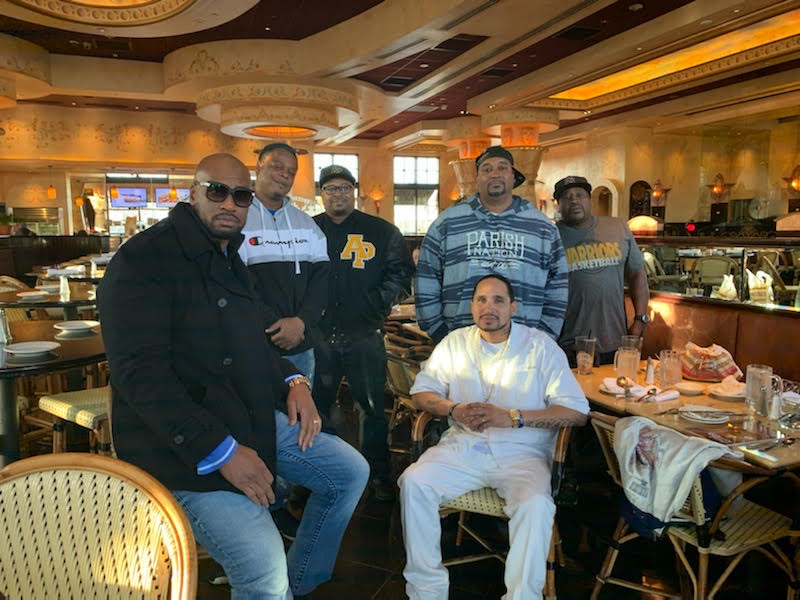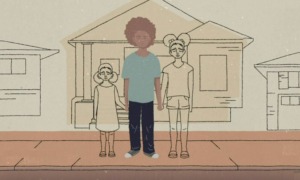
Advance Peace Change
Julius Thibodeaux, program manager of Advance Peace Sacramento, and his team of neighborhood change agents, Dedrick Suggs, Ezell Humphrey Grant, Marcus McGhee, Clemmie Fields and Freddie Dearborne Jr. (sitting in white).
Fresh shell casings are still scattered in the streets. Multiple sets of dice are still rolling like rocks in an avalanche. Bottles of liquor are still wet. Broken hearts with painful memories of gunshot victims remain fresh. Even in the midst of a global pandemic, the hood is still the hood. The basketball courts are empty, but the thick marijuana smoke still blocks the sun like thunder clouds in the neighborhoods where we are essential front-line workers.
Our organization, Advance Peace, is committed to ending gun violence and also short-circuiting the burdens of COVID-19 in communities most impacted by gun violence in the United States. Our teams of street outreach professionals are even more busy today than they were before stay-at-home orders were issued as a result of COVID-19.
Although COVID-19 is being dubbed “the great equalizer” and the virus is clearly taking on all comers, Blacks are still being hit the hardest. According to the BBC, 33% of those hospitalised in the U.S. are African Americans. We are only 13% of the U.S. population. African Americans are 50% more likely to have heart disease than white people and 40% more likely to die at an early age from any cause. Nineteen percent of us simply can’t afford to see a doctor. Still, at the end of the day, young Black and brown boys are still more concerned about being brutally murdered in the streets than they are about catching the coronavirus.
For someone who has not lived this lifestyle, we are sure that a number incidents captured by the mainstream media or blasted across social media showing groups of young people in Black and brown communities ignoring social distancing protocols, stay-at-home orders and acting like COVID-19 is nonexistent has been surprising, even frustrating. However, for us who share a common lived experience and background with the population we serve, we haven’t seen anything that has surprised us at all.
It would take a drought of some sort coupled with a catastrophic disaster to really grab the undivided attention of these young people. We know, because many of us experienced the cocaine drought of 1989 coupled with a major earthquake in California — this truly caught our undivided attention. As young people involved in the drug trade, we literally had no idea how we were going to pay rent, feed our families or cover the costs associated with our standard of living. All the things that today many in White America are panicking about as they protest in the streets to secure a lifting of the stay-at-home orders.
We bring them truth and nurture them
We didn’t watch the news or educational shows as young “thugs.” Neither do the young people we work with today who are caught up in the cycle of firearm hostilities. And what they do see on the news, they don’t trust or believe. COVID-19 is a hoax to them.
To have someone who comes from the streets just like they do tell them that coronavirus is most definitely real and people are actually dying from it carries more weight than the news. This is our role as credible messengers, building on hard-earned trust. This has been an important factor toward successfully encouraging some to change their behaviors. Information about how real COVID-19 is and admonishment to respect the public health orders is a vital part of “flattening the curve” in neighborhoods most impacted by gun violence.
Until gun violence is no longer a worldwide pandemic for Black and brown people it should be considered a pre-existing health condition. Young Blacks and Latinos are born into gang life and trauma-impacted communities on a crisis level.
Many of us were early teens before we felt the need to own a gun. That’s old nowadays. Children as young as 5 and 6 are mimicking violence that they’ve witnessed in their homes and in their environment. We don’t mean cops and robbers or your typical cowboys and Indians. We mean Omar and Marlo from the HBO series “The Wire.” These children are destined to become perpetrators or victims of gun violence. It’s how they’re learning to resolve conflict.
Many of us are poor, uneducated, oppressed and emotionally scarred for life by some adverse childhood experience. We live lifestyles that make us vulnerable to poor health and death at an early age. We’re segregated into ghettos with liquor stores on every corner and a gun store across the street from the liquor store.
Our public school system is a breeding ground for prison. We punish our children when they cry out for help by suspending and expelling them. There’s no counseling for the abuse they suffer at home. No cognitive behavioral therapy for direct or vicarious trauma that they experience on a regular basis.
What we used to hear and our young boys today hear too often is: “Be a man, you little punk! Quit crying and be a man! Wipe those tears and shut up before I give you something to cry for.” Yet he’s only 4 years old. Even if he can afford to go to the doctor when he gets older, he probably won’t. We’ve been conditioned to be tough. To suppress our pain and hide our emotions. All this combines to damage our immune system and our brain’s ability to make healthy choices. It’s no wonder we are suffering from dual epidemics: gun violence and coronavirus.
Our work at Advance Peace aims to offer “real nutrition” to our community, which is daily doses of love, caring and support. We work to boost the immune systems of those traumatized and at the center of gun violence through healthy food and housing, but also through stable mentorship. We are breaking the cycle of a response to trauma that says, “I don’t give a f*” to a healing approach that treats our most vulnerable to get to a place where they say, “Maybe I do.”
We are making progress. For example, no juvenile has been killed by a gun in Sacramento, California for the past two years that our program has been operational there. We have a long way to go to stop our young people from continuing to solve their problems by pointing a gun at someone who looks just like them and squeezing the trigger. This pandemic hasn’t changed much, since it’s still just another day in the hood and interrupting death is needed more than ever.
Julius Thibodeaux, program manager of Advance Peace Sacramento, and his team of neighborhood change agents are co-authors in this effort (Marcus McGhee, Dedrick Suggs, Clemmie Fields, Freddie Dearborne Jr. and Ezell Humphrey Grant).




























